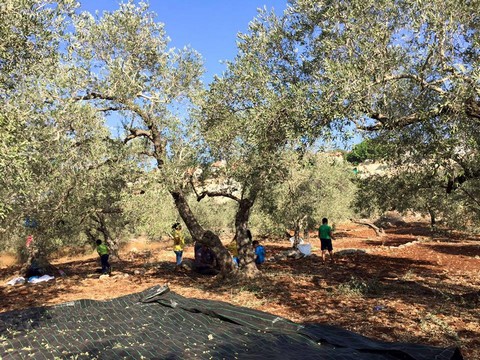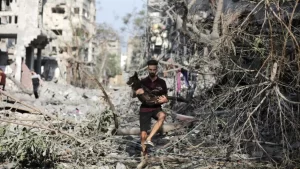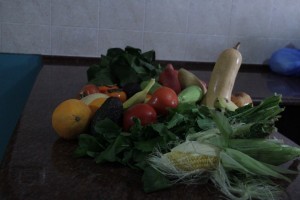What suits Paris doesn’t necessarily fit Ramallah.
By Ahmed Safi
First of all, I wish I could convey my message to you correctly. I hope that the ideas I raise here will trigger a civilized debate away from any intolerance or attack.

Over the past centuries, since the emergence of superficial concepts such as the term “third world”, we peoples of the global south became accustomed to prescriptions that the global north would come up with as solutions for our socio-economic problems. These ready-made solutions come to u from those who believe that they can, while sitting behind their computer screens, offer effective solutions for these problems. In the back of their minds, they develop solutions based on the stereotypical orientalist viewpoint, a viewpoints that is very attractive to the west that reduces the east to images of palm trees, animals, noise and chaos, internal violence, and the persecution of the vulnerable and the weak.
These solutions that are just dropped upon the east from above, find those who unfortunately go along with them, because few as they are, they lack self-confidence in their ability to act appropriately and find solutions for their problems themselves in a manner that aligns with their environment and their specificity.
The specificity of societies in terms of systems, laws, and beliefs must be taken into account in every process of change. This change may be successful when it is done in a well thought-of and and gradual manner, even if slowly. Other elements for successful change and transition include this change being led by members of the community themselves on their vision and knowledge about areas where such change might be possible and their privilege of understanding more than anyone else of the factors for success and their relations to those stakeholders who have the power and capacity to influence the public opinions in their respective communities.
.
The historic responsibility of former colonial powers or another form for the transfer of knowledge?
Can this be understood as a sense of guilt among orientalists who inherited the colonial legacy, attempting to relieve it by extending a helping hand to the most need? Maybe.
Or is driven by this conviction amidst some who believe unequivocally, given the historic experience of colonialists, that they are best suited to bring change to countries that are under colonialization because they are financially or culturally ‘superior’ or due to their ability to travel easily among countries?
In this context, we must ask ourselves: can this knowledge or experience of such persons be easily and readily transmitted and implemented? Let us take the subject of animal welfare and veganism a model.
The role of the ‘other’- The ‘White Man’s burden’ specifically
Awareness of animal welfare and veganism issues has existed here — i.e., the global south, including the East — over the past years.
But modernity imposed many of the terms, ideas and interpretations that accompanied the philosophy behind it, those ideas that raised, discussed, researched and debated.
The same happened in the East, but it was not framed within any .research work.
Now, there are many terms, such as Animal Rights, Animal Welfare or Animal Liberation, about which activists have been divided, each defending their idea and the mechanisms they adopt to implement them.
I thought that activism in the field of animal and veganism rights is the most peaceful and honest of all the human activities and actions. However, I discovered that it is no different from any other field, since it is unfortunately full of conflict of interests and ideas. I also felt that there were aspects of exclusion, rejection of the other and rejection of any new approach or paradigm.
Thus, we found ourselves in the South automatically divided, . We are forced to determine where we are, which school of thought or approach we adopt, and which group are we seen as being part of it.
Here, the questions raised are not addressed to the white man claiming enlightment only, but equally to us as activists.. Among these questions, a question arises as to the nature of the idea itself. Is our idea optimal, and therefore we should spread it as a kind of immortality or self-esteem that we are looking for?
So what is the difference between our imposition of our ideas on our own communities, presenting these ideas as the best solution to the problems of contemporary humanity, and the dissemination of ideas that colonialism has been doing that it claimed to be the best solution to the problems of people under its control?!
I believe that there are some issues and concepts, in terms of ethics and way of thinking, that are agreed upon universally , i.e. in the north, south, east and west. However, the difference may lie in the mechanism of expressing our rejection of violations that may vary from place to place.
Motivation for attempting to bring about change within the society of the ‘other’ In the international context, I would like to recall Che Guevara to refer to the concept of the internationality of revolutions and the dissemination of the ideology of resistance to oppressed people. But I don’t think there’s a similarity in the way the white people are trying to claim that their presence is aimed at bringing about an internal change because we are more vested and more capable of doing that. At the same time, I believe that the rationale for the need to help in this context is linked to the mindset of ‘superiority’ and claims of having knowledge and ability to bring about the change, as well as a belief that this knowledge gives a right to control the ‘other.’
In terms of our experience, we have lost very important funding for the castration and sterilization program due to the inconsistency of the model prepared by donors in Palestine, the limited resources and tools needed, and the protocol that is developed in the donor country is based on the available means and resources. based on the available possibilities, energies and resources as well.
This logic, which is driven by the superiority of knowledge, has not taken into account what is available to us, and what is possible and not possible because of the occupation that sets up a system that restricts movement. This logic also does not take into account the public’s acceptance of such a new work. Since donors felt that it had the upper hand in determining our directions, we had to stop.
This situation, where the donor claims superiority, and considers it a collective example of backwardness and inability to follow the correct instructions or simple logic, is something that we absolutely reject.
This awareness of the value of information, the resources and superiority of large institutions took a different manifestation among individuals “in good faith” or even without it Individuals adopting this methodology deemed it as ‘the’ methodology to follow. They failed to apply it to us based on logical standards that they felt we needed to accept, but they showed ‘understanding’ of our limited thinking capacities and flawed performance and thus we have to feel grateful for their understanding and tolerance of us and allow them to lead the way forward towards a less ‘brutal’ future.
A sense of superiority and the ‘superiority of concepts’
The approach to the concepts used in this field of work has allowed those who are ‘superior’ to interpret and apply these concepts in an abstract manner.

Animal Right means in Arabic the animal’s right “by law, justice and certainty to own its destiny.” Do we have the right to sterilize the animal and prevent it from having offspring? Do we have the right to turn the dog to a vegan diet? Is stopping the eating of vegetables enough to give the animal its due? Maybe here we should stop claiming a positive perspective of what we are doing, and say that what we are doing is in our best interest as human beings.
One day, an animal rights activist asked me: When would you transform to an animal liberation organization? I didn’t understand the strange content of the word, and I didn’t understand its significance, until I asked and found out that it meant freeing animals, for example: stop using horses to plow the earth. I asked my friend about the mutual benefit of the work of horses in tilling the land, and he replied that there is no choice for animals here.
In a rugged mountainous environment such as Palestine, the machines cannot enter, as tree branches can break down because they are close to each other, and the machines use fuel and therefore damage the environment. Leaving the land would put it under the risk of confiscation. How are we going to free others and be free, and are these ideas feasible?
Animal welfare means in Arabic compassion with and for , mercy
One day we applied for the “Youth for Change” project, which aims to train volunteers to work with children to guide them about the needs of animals, in terms of compassion for them, and to provide green healthy nutrition and any other initiatives that children see as important in their environment. We were surprised that one of those who have the power of knowledge and influence in in terms of financial decisions responding to the project by saying that this is an animal welfare project while we only fund animal rights
In fact, I didn’t know the difference between them until I asked for help from friends. Yet, I am still more confused about the mechanism of applying this concept,. However, my response was: I care less about the jargon and its complications, what I know is that there is a need for an intervention somehow, and I am a believer of gradual interventions.
Here’s the question: do we, as working groups in the same field or space, have to identify with any part of these definitions that are being used? Will that give us an intellectual identity to have the power and the power to defend this term or to change reality itself?
Which Countries Eat The Most Meat Each Year? [Infographic]

We consider this program to be an open space for the younger generation to lead the change in any field that they deem needed; a library in a health center for example, or spending a day with the elderly, a chance cafeteria or a green day at school or the publication of the idea of multi-use cotton bags.
“All of this does not matter in the eyes of some people, and those who have adopted their ideology in adherence to a particular term or orientation, whether from the West or those who have adopted their orientation from our society,” and we were supposed to change a methodology that was developed over a four-year period.
Has the model succeeded in his country and now he is seeking to replicate it everywhere?
Let’s discuss the term veganism. Do you need to draw a visible tattoo on your body to highlight your nutritional identity? Do you have to introduce yourself like that?
The interpretation of the term “al Khudarieh” veganism was recently coined by an Arab colleague with whom I disagree in terms of the type of activity and the way he extends invitations, but agree with him regarding the idea itself. A quick review of the statistics show that change has been fluctuating, increasing or dropping at times Despite the huge efforts to convince people to shift towards veganism, and the spread of this idea, yet we notice that rich countries are the highest consumers of meat and at the same time are the highest in terms of tendencies to go vegan among the population. Therefore, we need to start thinking about changing how we work and what messages we share but not the core issue at stake.
The efforts exerted are high compared to the results and thus we need to go back to the root cause of the problem. The developments in terms of animal production and leather industries are taking a terrible curve in countries of the global north or in developed continents who are the main producers and exporters to other countries.
Since we started working until this day, we do not make it obligatory upon volunteers within the organization to be vegan- it is true that we have asked them to give up any animal product while representing us, while being present at our offices. But we have no option but deal with all the segments of the society and because we are convinced that ideas cannot be imposed but rather embraced and adopted by individuals independently.
Often we get attacked by some over our different methods and approaches instead of them working, building, and changing the situation in the way they deem appropriate and possible given their capacities. This is the case sometimes of volunteers coming from the countries of the global north. This can be described as an annoying attitude almost with implied tones of bullying based on the claimed ownership of knowledge that they believe is the only knowledge that should be adopted regardless of the context and realities on the ground and without any consideration of differences of the local environment.
An example to this (in terms of our differences with those who share our common cause) is our disagreement about describing killed animals as martyrs comparing them to the Palestinian martyrs who were killed by the Israeli occupation because this would have a negative impact and would be detrimental to the mission of our organization.) Example (how could it be helpful if we stripped now in one of the plazas in Morocco to protest the killing of animals. Similarly, how does it help if we protested in Gaza for animal wels. The communities and societies are not stupid and are capable to fight back in order to preserve their ‘being’ from change. Therefore, either you stand alone or stop with many enemies.)
Each concept takes form in reality and relates to it with a number of actions. The question remains: does this concept or term fit or align with the reality of other societies?
Intersectionality
The term ‘intersectionality’ was associated with the struggle of black women for their rights in the U.S. Groups were formed who believed in their right to justice. These groups shared the same general characteristics but with different approaches and orientations in line with their needs.
The collective awareness of these groups clashes sometimes with the awareness of their individual members. The context currently calls for dismantling the intersectional mother groups and seek to empower similar individuals as individual identity within the group to express their individualism. This means the enhancement of individual rights of these groups that could isolate issues of collective nature and transform them into a question of individual freedoms that can be addressed and change the laws that do not influence existing frameworks and systems.
This tendency might be attractive to individuals in the most oppressive societies. This can be noticed in the context of globalization where the world imagines life in Europe, specifically in terms of the concept of personal freedoms, in a manner that is far off from the reality that these individuals live in of complete individualism through which governments were able to maintain full control over the minds within a democratic format through which governments allow citizens to express and release individual issues that have become similar.

Working in the field of animal welfare is the easiest work most welcome work always compared to other issues, yet others in the western world see a revolutionary aspect to such an activity.
Transforming intersectionality from a collective process of thinking and acting to general social rights and eventually individual rights pushes us to think of what is better. Plato’s ideal city does not exist in the world. It is not possible to have a full system that guarantees respect and acceptance of differences among individuals and groups. The discussion now revolves around nationalism that I see in many cases being casted away in some countries while it is a favorite topic in other countries such as Palestine.
The range of these issues and aforementioned concepts and terms constitutes a very exciting model for any westerner who has the desire to bear this burden. It is very important for him/her to be a defender of a number of rights. A feminist vegan activist who lives without rights under the occupation is an example through which that westerner attempts to reinforce her image as a victim under a male-dominated patriarchal society and strengthens her image of herself as a victim that fights for change. From here, the plot evolves and grows and this kind of westerner finds importance in his role and the need for his presence as a white, civilized, modern, and enlightened savior.
What do we want?!
The format of action that is needed and that is built on a number of objectives that are its center of focus has many implied risks. We took it upon ourselves to promote the idea of animal welfare and protection in Palestine while not identifying with any of the concepts and terms initially. We thought it was good to join animal rights only to discover later several areas that require us to intervene one way or the other.
Spreading out too thin into several directions had led to distraction and scattering of our efforts. Therefore, we believe that we should be doing is what the society needs in terms of change. We should not expect quick results. Addressing the phenomena is good but addressing the root causes is better. We also discovered the importance of focusing on the need rather than the application of the theory. Gaining the local community’s satisfaction and bringing them around the idea is better than gaining donors or those who own the idea themselves and that any activity should correspond and be acceptable to the public and their needs.
Experiences teach us a lot. In Palestine, we went through many difficult experiences, the most prominent of which are attempts to mold them to look similar to other experiences or to try and change their approach or even the imposition of ideas to be adopted. These attempts often came from individuals who joined us and were attracted by our ideas but have not gone through similar conditions and did not and will not understand the idea that this is a completely different environment.
.
Do we have to protest on the streets of Ramallah in order to stop the killing of animals? This is a crucial question. There are protests demanding the freedom of prisoners, there are rallies and funerals for martyrs. Would the size of our protest call upon sarcasm from others? Would the limited number of protestors an excuse for others to look at us nonchalantly? Is it the only way forward? Maybe not. Maybe, we should approach youth and schools, grow the idea from its roots with them so that few years down the line they become vocal in their advocacy for animal rights.
Do we have to share pictures of naked protestors with red paint on social medial platforms to promote veganism? These issues might cause a lot of controversy and distract us from achieving our objectives. So, it’s better to respect traditions and customs while being different as an individual within the framework of your society are important things for the success of the idea.
The local community throws upon us sometimes major responsibilities or tries to change or shift our activities towards saving injured animals on the streets such as cats, dogs, or donkeys. The task here requires a lot of efforts, resources, and equipment. I believe this should be the organization’s main mandate. The spreading of the idea and the establishing of groups with different tasks are important part of the organization’s main mandate aiming at role division and distribution of volunteers according to their areas of interest.
I disagree with those who have shelters for dogs and cats and those saved in terms of veganism. I agree though with the need for their presence in order to fulfill the tasks that are the focus of their efforts.
We need to final alternatives and work in the field rather than just be satisfied with theorization or making statements on social media. Our presence on the ground, in the field, if very important.
We need to be fully convinced of the importance of our independence and that we might sometimes make mistakes, but this does not mean the end, but rather a very important instrument for changing our mission and learn from experience.
The ability of terms and concepts to intrude and shake their understanding in other languages pushes us to stop attempting to believe that they can bring about change in the way they are structured in their own language. Thus, we need to think carefully whether or not we should be faithful to the terms as manifested in activities associated with them, or is it better to find another practical interpretation of these texts and terms?




